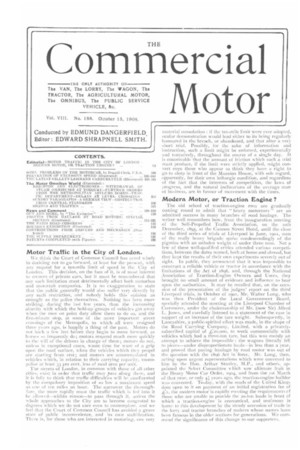Modern Motor, or 'Fraction Engine ?
Page 1

If you've noticed an error in this article please click here to report it so we can fix it.
The old school of traction-engine men are gradually coming round to admit that " heavy motorcars " are an admitted success in many branches of road haulage. The writer well remembers how, from the inauguration meeting of the Self-Propelled Traffic Association, on the loth December, 1895, at the Cannon Street Hotel, until the close of the third series of trials at Liverpool in June, 1901, men of the really heavy brigade spoke condescendingly of the pigmies with an unladen weight of under three tons. Not a few of these well-qualified critics attended various competitions, between the dates named, both at home and abroad, but they kept the results of their own experiments severely out of sight. In public, they announced that it was impossible to construct a reliable vehicle or tractor in accordance with the limitations of the Act of 1896, and, through the National Association of Traction-Engine Owners and Users, they brought no small amount of evideitce and influence to bear upon the authorities. It may be recalled that, on the occasion of the presentation of tile judges' report on the third Liverpool trials, in October of igoi, Mr, Walter Long, who was then President of the Local Government Board, specially attended the meeting at the Liverpool Chamber of Commerce, under the chairmanship of Mr. (now Sir) Alfred L. Jones, and carefully listened to a statement of the case in support of an increase of the tare weight. Subsequently, in Lancashire, a public-spirited effort was made, in the shape of the Road Carrying Company, Limited, with a privatelysubscribed capital of ,;20,000, to work commercially with vehicles which had a three-ton tare, but this was merely an attempt to achieve the impossible : the wagons literally fell to pieces—under disproportionate loads—in less than a year, and proved that paying haulage by road motor was out of the question with the 1896 Act in forte. Mr. Long, then, acting upon urgent representations which were conveyed to him by the Hon. Arthur Stanley, M.P., and others, appointed the Select Committee v hich saw ultimate fruit in the Heavy Motor Car Order, 1904, and from the ist March
ef that year, or only years ago, the traction-engine builder was converted. To-day, with the roads of the United Kingdom open to it on payment of an initial registration fee of Zt, the modern motor is rapidly meeting the requirements ef those who are unable to provide the 20-ton loads in front of which n traction-engine is economical, and testimony is borne to this development by the steady accession of trade in the lorry and tractor branches of makers whose names have been famous in the older sections for generations. We coalmen(' the significance of this change to our supporters.






























